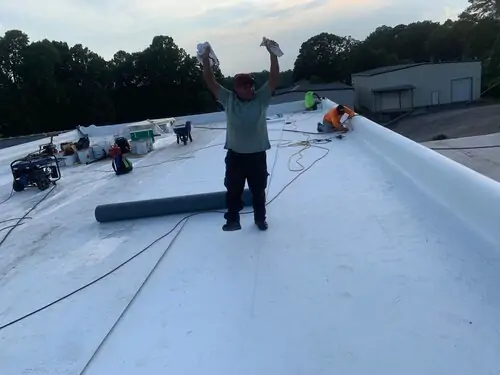In cold weather climates, the performance of roofs is put to the test. This article by United Contracting & Roofing, the distinguished commercial roofing services provider in Atlanta, GA, explores the resilience and durability of TPO roofs in facing the challenges of freezing temperatures. From their flexibility in handling cold to their resistance against cold cracks, TPO roofs are a reliable choice. Their strong winter seams and ability to withstand snow loads make them a preferred option. With the right insulation and regular inspections, TPO roofs ensure comfort and preparedness during winter.
Key Takeaways
- TPO roofs demonstrate exceptional flexibility to counteract the effects of cold contraction and can expand and contract without sustaining damage.
- Proper installation techniques and regular maintenance are crucial to maintain TPO roofs’ strength and winter seams.
- TPO roofs have excellent snow load resistance due to their construction, material properties, and reinforced seams.
- TPO roofs have reflective properties that promote efficient snow melt, reduce heat absorption, and minimize ice dam formation.
Flexibility In TPO Roofs: Beating Cold Contraction
TPO roofs from United Contracting & Roofing showcase remarkable flexibility designed to combat the impact of cold contraction. In commercial roofing, this attribute proves pivotal, guaranteeing the durability and longevity of the roof, especially amid harsh winter conditions. Our expert commercial roofing contractors consistently advocate for TPO roofs due to their exceptional ability to withstand the challenges posed by cold weather. Regarding commercial roofing solutions that prioritize resilience in all seasons, United Contracting & Roofing is a trusted partner committed to delivering superior performance and longevity for your roofing needs.
Now, what is a cold contraction? Cold contraction is a phenomenon that occurs when materials contract due to low temperatures. This can cause stress on the roofing system, leading to cracks, leaks, and other structural issues. However, TPO roofs have been specifically designed to combat this problem. The material used in TPO roofs contains additives that enhance their flexibility, allowing them to expand and contract without sustaining damage.
Furthermore, TPO roofs have a reinforced membrane that provides additional strength and resistance to cold contraction. This membrane protects against temperature changes, ensuring the roofing system remains intact and leak-free.
In addition to their flexibility, TPO roofs offer several other advantages for commercial roofing services. They have a reflective surface that helps to reduce energy consumption by reflecting sunlight and reducing the amount of heat absorbed by the building. This can lead to lower heating and cooling costs for businesses.
TPO’s Winter Toughness: Resisting “Cold Cracks”
United Contracting & Roofing advocates for TPO roofing, characterized by its fortified membrane and heightened flexibility, showcasing impressive resilience against ‘cold cracks’ caused by winter temperature fluctuations. This durability is necessary in areas with severe winter conditions, where the intense cold can lead traditional roofs to crack and degrade over time. In stark contrast, TPO roofs are purposefully engineered to endure such challenges, offering steadfast protection throughout the winter season. When seeking commercial roofing services prioritizing longevity and performance, United Contracting & Roofing champions TPO roofing as a reliable choice for enduring winter weather conditions.


